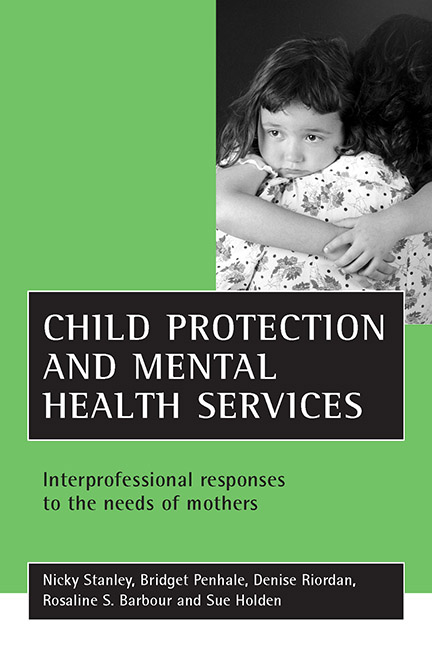Book contents
- Frontmatter
- Contents
- List of tables and figures
- Introduction
- one Mental health needs and mothering
- two The service context
- three Interprofessional work
- four The research study
- five Identifying key research issues
- six Mothers’ perspectives
- seven The mothers’ evaluations of professional support
- eight The professionals and their practice
- nine Conceptualising needs and evaluating risk
- ten Interprofessional communication and coordination
- eleven Identifying appropriate resources
- twelve Conclusion
- References
- Index
- Also available from The Policy Press
Introduction
Published online by Cambridge University Press: 20 January 2022
- Frontmatter
- Contents
- List of tables and figures
- Introduction
- one Mental health needs and mothering
- two The service context
- three Interprofessional work
- four The research study
- five Identifying key research issues
- six Mothers’ perspectives
- seven The mothers’ evaluations of professional support
- eight The professionals and their practice
- nine Conceptualising needs and evaluating risk
- ten Interprofessional communication and coordination
- eleven Identifying appropriate resources
- twelve Conclusion
- References
- Index
- Also available from The Policy Press
Summary
In the context of family life, children are usually portrayed as dependent and as more vulnerable than their parents; their needs are accorded some priority in recognition of their rights to protection. When parents themselves are vulnerable, agencies’ standard responses to families are called into question.
This book is concerned with the professional response to families where mothers have mental health problems and there are concerns about the children's welfare. It presents the findings of a research project which, alongside an exploration of mothers’ perceptions of their mental health problems, examined the ways in which professionals conceptualise and try to meet those needs. Since the mental health problems of mothers may pose risks for their children, both adults’ and children's services are likely to be involved. Therefore, interprofessional collaboration and communication are key themes of this book.
While the needs of children and adults interact in complex ways, the close relationship of the two is not reflected in the organisational structures of health and social care services. General Practitioners (GPs) are one of the few healthcare professionals with a remit to work with all family members; the majority of health professionals work with either children or adults. In social care, practitioners also have a primary focus on either children or adults, and agency structures reinforce this divide. Although a range of national and local developments have aimed to promote interprofessional and interagency work between health and social care services, such shifts have been located within adult services or within services for children. Increasingly, adult mental health services are provided by joint trusts or teams in which the work of social services and community health staff is integrated. In child care, the emergence of Children's Trusts (DWP, 2002) signals a shift towards similar models for the delivery of a range of health and social care services. The gulf between children's and adults’ services remains difficult to bridge. While both mental health and child care practitioners may acknowledge and recognise the contribution of other family members to the welfare and health of their primary client group, service structures will render those providing services to other family members more distant and less accessible. Professional identities and allegiances may act to reinforce structural divisions.
A focus on mothers’ mental health requires some explanation. Despite their increasing participation in the workforce, mothers have retained their primary responsibility for child care (Ferri and Smith, 1996).
- Type
- Chapter
- Information
- Child Protection and Mental Health ServicesInterprofessional Responses to the Needs of Mothers, pp. v - xPublisher: Bristol University PressPrint publication year: 2003



